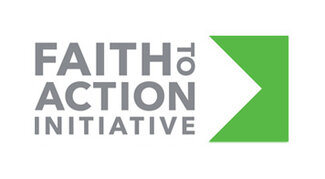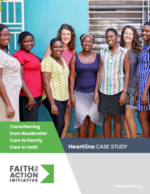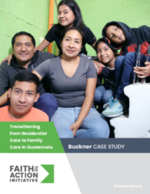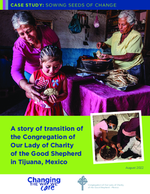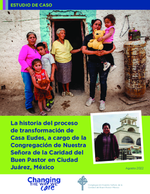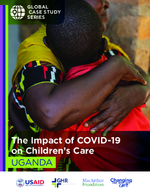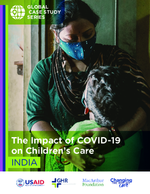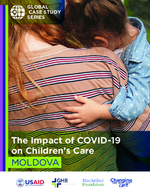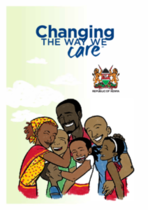In 2006, members of the Better Care Network formed the FBO outreach committee in order to promote better practice within the faith-based orphan care community. This committee formalized in 2008 and is now known as the Faith to Action Initiative.
The Faith to Action Initiative brings together Christian faith-based organizations, churches, and individuals seeking to respond to the needs of orphans and other vulnerable children in Sub-Saharan Africa. The core focus of the Initiative's work is to promote approaches to orphan care that uphold the value of family and community in the life of a child.
The Faith to Action Initiative began as the BCN Faith-Based Organization (FBO) Committee. The overarching aim of the BCN FBO Committee was to dialogue with churches, organizations, and leaders in the faith community for the purpose of promoting better practices in regards to orphans and vulnerable children (OVC), including gathering information about orphan and vulnerable children (OVC) responses already underway, to encourage increased OVC support in general, and promote better care practices.
The BCN FBO Outreach Committee’s core group comprised of four members of the Better Care Network Advisory Group: Kerry Olson, Firelight Foundation; Diana Aubourg Millner, Save Africa’s Children; Mary Dallao, Family Health International; and Steve Haas, World Vision USA as well as Jon Singletary, professor of Social Work at Baylor University and John Derrick, Training Specialist with Cooperative Baptist Fellowship’s Global Missions. John Williamson of the Displaced Children and Orphans Fund, Aaron Greenberg of the Better Care Network and UNICEF and Jennifer Delaney of Global Action for Children also participated in an advisory capacity.The Committee has since evolved into its own entity - the Faith to Action Initiative - and BCN Director Florence Martin is a member of its Leadership Council.
Recommended Resources:
A Continuum of Care for Orphans and Vulnerable Children
Children, Orphanages, and Families: a Summary of Research to Help Guide Faith-based Action
Key Research on Orphanages and Family Care: An Annotated Bibliography
Community and Family Models of Care for Orphans and Vulnerable Children in Africa
Where they operate
Organization Type
Main Areas of Work
What They Do
The Faith to Action Initiative serves as a resource for Christian groups, churches, and individuals seeking to respond to the needs of orphans and vulnerable children in Africa and around the world. They offer practical tools and resources, inspiring stories and examples, and up-to-date information on key strategies and research to help guide action. They seek to engage and equip churches and individuals through their website, publications, conference workshops and webinars.
Organization Resources
Resistance from donors is a common barrier for organizations transitioning from residential care to family-based care. What works to sustain and even increase funding for organizations in transition?
The story of Heartline’s transition from residential care to family care is told in this recently released Faith to Action case study. The case study details their experience through three stages of transition—learning, preparation and planning, and full transition—with transparency. It addresses common challenges for transitioning organizations, as well as the strategies Heartline took to overcome them.
The story of Buckner Guatemala’s transition from residential care to family care is told in this recently released Faith to Action case study. The case study details their experience through three stages of transition—learning, preparation and planning, and full transition—with transparency. It addresses common challenges for transitioning organizations, as well as the strategies Buckner took to overcome them.
This case study highlights the transition of the Sisters of Our Lady of Charity of the Good Shepherd in Tijuana. It presents the highs and lows that come with a change process of moving from residential care to community-based services focused on family strengthening.
Este estudio de caso destaca la transición de servicios de cuidado residencial a los basados en la familia y comunidad las realizado por las Hermanas de Nuestra Señora de la Caridad del Buen Pastor, en Ciudad Juárez, México.
This case study is part of a series of case studies conducted in India, Kenya, Moldova and Uganda over the course of 2020-2022 to share information on how COVID-19 has and is affecting family-child reunification, alternative care placement, and offers recommendations for family- and community-based care of vulnerable children in the context of COVID-19 and future emergencies.
This case study is part of a series of case studies conducted in India, Kenya, Moldova and Uganda over the course of 2020-2022 to share information on how COVID-19 has and is affecting family-child reunification, alternative care placement, and offers recommendations for family- and community-based care of vulnerable children in the context of COVID-19 and future emergencies.
This case study is part of a series of case studies conducted in India, Kenya, Moldova and Uganda over the course of 2020-2022 to share information on how COVID-19 has and is affecting family-child reunification, alternative care placement, and offers recommendations for family- and community-based care of vulnerable children in the context of COVID-19 and future emergencies.
Elli Oswald, Executive Director of the Faith to Action Initiative, reconsiders the best ways American churches can serve some of the world’s most vulnerable children and honor them as image bearers of God.
This handbook was made for children to read and write in. You’ll learn about why families are important and why they are the best place for children to grow up. There is also plenty of space for children to write down their thoughts and feelings about what they have read.

